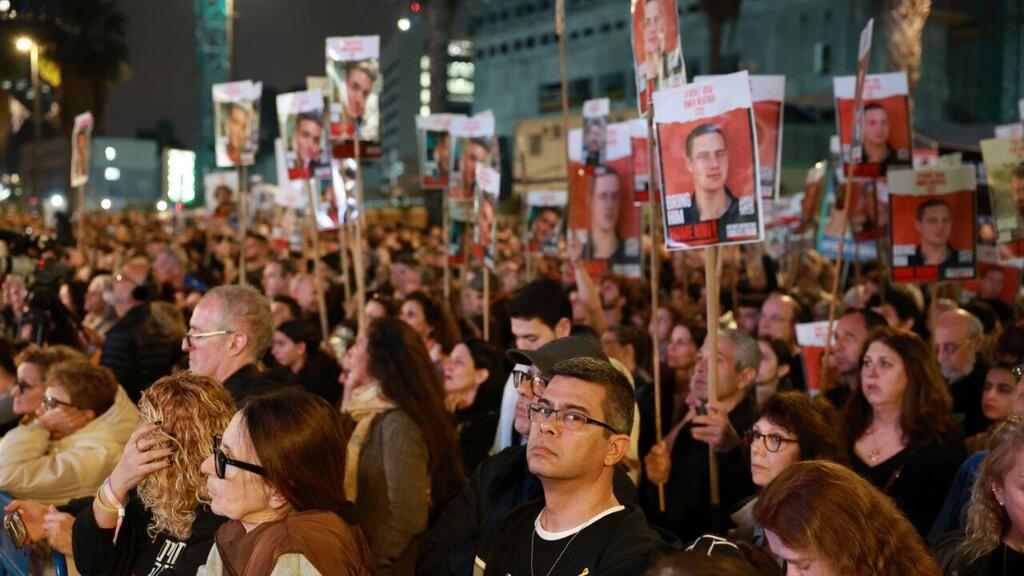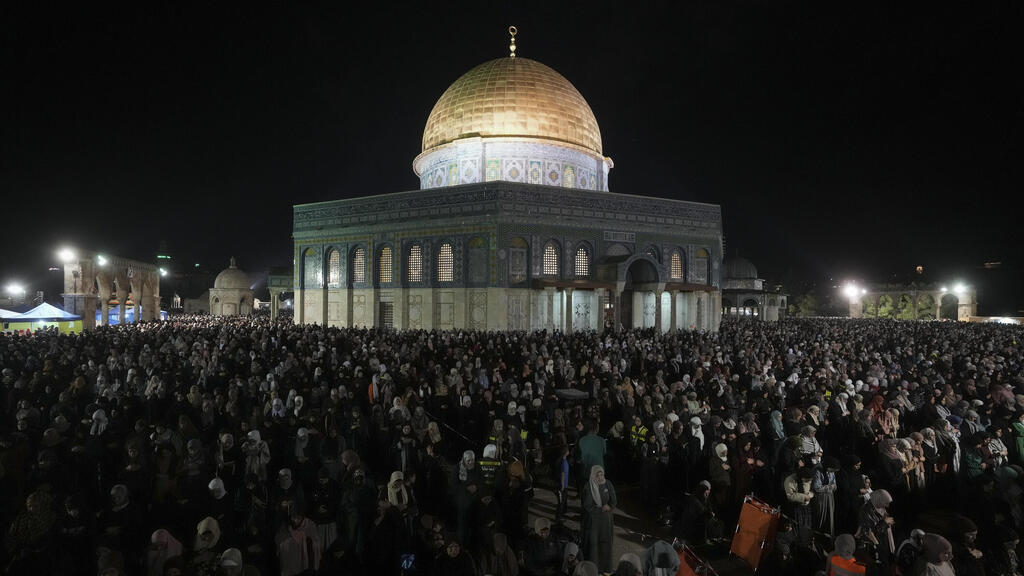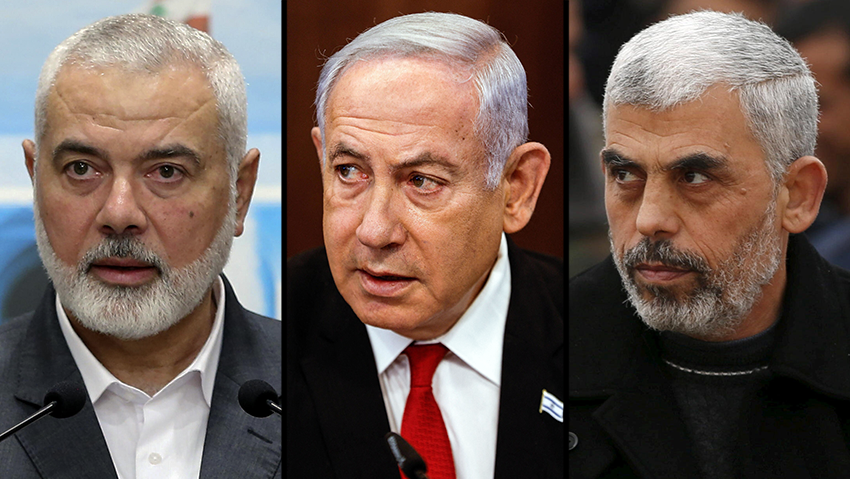Sources privy to the details say that the chances of arriving at a hostage deal with Hamas before the start of Ramadan, this Sunday, are diminishing, the New York Times reported overnight Thursday, in an article written in part by Yediot Ahronoth journalist Ronen Bergman. U.S. officials who spoke to the newspaper expressed concern that during the explosive period of the Muslim holy month it will be more difficult to reach an agreement between Israel and Hamas.
Read more:
The United States and mediators Qatar and Egypt have pushed in recent weeks to reach a deal before Ramadan, and even expressed optimism that this is possible following Israel's agreement to an outline formulated at the second Paris summit. At the center of the ouline is a proposal to release about 40 hostages - including women, elderly and sick - in exchange for the release of a significant number of terrorists during a six-week temporary cease-fire. Last week, U.S. President Joe Biden expressed great optimism that a deal could be reached quickly, but later sounded more cautious and two days ago said that the deal was "in the hands of Hamas."
Sources familiar with the details of the talks told the Times that in recent days Hamas representatives have distanced themselves from the proposed outline and raised demands that Israel refuses to accept. A regional official, who like all those interviewed for the article spoke anonymously, said that the main point of contention is the one that has been making progress in the talks difficult for weeks: Hamas' demand that Israel commit now to a permanent cease-fire, which will come into effect during or at the end of three stages of releasing hostages. Israel has refused this condition, and demands that the agreement focus only on the terms of the first phase, the one that deals with the release of about 40 hostages. The U.S., according to the report, supports the Israeli position.
Israeli officials stated that they believed a "broad consensus" had been reached regarding the first phase of the agreement, but then, according to them, Hamas returned to advancing its broader demands. Along with a permanent cease-fire, according to the report, Hamas also insists on the withdrawal of IDF forces from the northern Gaza Strip after the third phase of releasing hostages, and the expansion of humanitarian aid to the Strip.
In his own words, Biden said that the outline that was drawn up, the one that only deals with one stage of a hostage deal with a temporary cease-fire of six weeks, is "rational" and that now all that is required to implement it is the consent of Hamas. Last night, the spokesman for the National Security Council at the White House, John Kirby, admitted that the U.S. is disappointed that a deal has not yet been reached, but said that the mediators are "confident" about the terms of the proposed deal. "It's just a matter of getting Hamas to sign it," he said.
The NYT report about pessimism over the talks comes after such pessimism was expressed in Israel as well, because Hamas refused to provide information on the number of hostages who are still alive among the 40 who are supposed to be released in the deal, as well as on the "keys" to the release of terrorists, that is, the number of security prisoners it demands to be released for each hostage. This was joined by another report Wednesday night, in the Wall Street Journal, which reported that the contacts are now entering the "most dangerous phase" in weeks.
According to the Wall Street Journal, Hamas almost abandoned the talks in Cairo on Wednesday - to which Israel refused to send representatives because it did not receive answers about the number of living hostages and the number of terrorists that the terrorist organization demands to be released. Egyptian officials told the newspaper that Egyptian intelligence chief Abbas Kamel had to "intervene" to convince Hamas to continue talks for one more day despite the impasse. That day has already passed, and no progress seems to have been made.
The WSJ notes that alongside Hamas' demand for prior agreement to a permanent cease-fire at the end of the temporary cease-fire, there is another dispute in the talks: whether Palestinian refugees of "fighting age" will be allowed to return to their homes in the northern Gaza Strip. According to the report, Hamas is pushing for a complete withdrawal of the IDF from the Gaza Strip, demanding that hundreds of thousands of refugees who fled to the south of the Gaza Strip be allowed to return to the north - and insisting that family members not be separated from each other. Israel, the Egyptian officials told the newspaper, agreed to allow only women, children and the elderly to return to the northern Gaza Strip during the break.
3 View gallery


Israelis protest for the release of the hostages in Hostages' Square in Tel Aviv
(Photo: Dana Koppel)
An Israeli source clarified to the newspaper that the cabinet has not yet approved any return of Gazans to the northern Gaza Strip. Another source stated that Israel is not interested in allowing such a return because Hamas terrorists continue to operate in the area. He added that in Israel they are worried about the possibility that terrorists will blend in among civilians in order to reach the north of the Strip and help Hamas restore its capabilities there.
In recent days it has been estimated in Israel that one of the reasons Hamas is hardening its positions in the talks is the desire of the leader of the terrorist organization in Gaza, Yahya Sinwar, to bring about further escalation in the Middle East during Ramadan. Sinwar, according to Israeli officials, hopes that the crisis in the negotiations will not only lead to chaos and more destruction in the territory - but also to the unification of the fronts, something that he has not been able to implement so far with great success.
Such an Israeli assessment was also noted in the report overnight in the New York Times. The American newspaper reported on the call at the end of last month by the leader of the political bureau of Hamas, Ismail Haniyeh, for Palestinians and Israeli Arabs to "march" to the Al-Aqsa Mosque on Ramadan.
The report raised another possible reason for the hardening of positions on the part of Hamas: the aid truck disaster in Gaza last week, in which more than 100 Palestinians were killed under the cover of the chaos created when thousands swarmed the trucks. The IDF soldiers who were in the area did indeed open fire during the riot, but according to the military investigation most of the dead were trampled or run over to death. According to the Times, there are sources who believe that Hamas leaders may believe that the disaster strengthened their position in the negotiations and also weakened Israel's position in the international arena.




